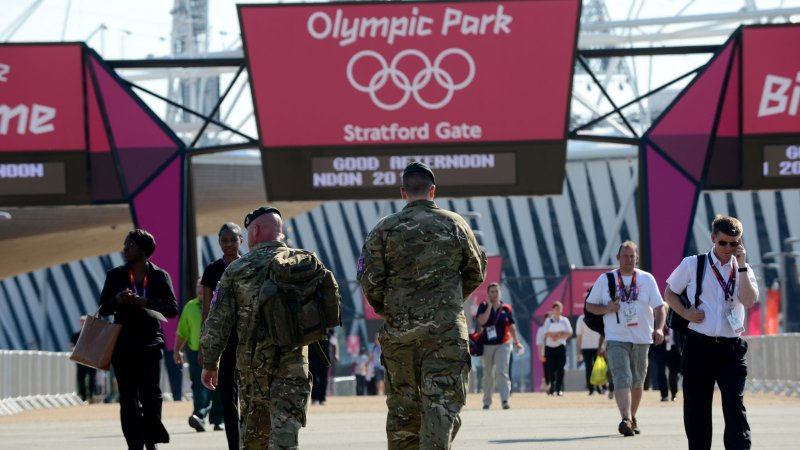British Army troops walk beneath the Olympic Park sign with the Olympic Stadium in the background on July 24, 2012 in Stratford, East London. The army began to patrol Olympic Park after a private security firm came up short on the number of security personnel needed for the London 2012 Olympic Games. UPI/Pat Benic |
License Photo
RIO DE JANEIRO, July 25 (UPI) -- The security fiasco at London Olympics is seen by analysts as a timely lesson for Brazil, which is preparing as the site of the FIFA World Cup in 2014 and the Olympic Summer Games two years later.
The chaotic start-up to the Olympics security arrangements in London forced British Prime Minister David Cameron's government to rewrite plans and call in troops, something that critics say should have been agreed from the beginning.
It also angered a range of police and public security agencies and services that were sidelined when the government awarded lucrative contracts to a controversial security firm.
G4S and its subsidiaries were cited in a series of snarl-ups and involvement in contracts criticized for human rights violations.
G4S has an annual turnover of more than $10 billion, contracts in Iraq and Afghanistan and past roles in scandals involving prisons, prisoner transportation and other incidents that drew criticism from the U.S. Senate, other international lawmakers and human rights advocacy groups.
Despite those problems, G4S tops a growing list of security agencies that are taking over government security functions across the world. Outsourcing of security functions to private sector companies is set to become a global business worth tens of billions of dollars.
More importantly, governments are being persuaded to accept the security companies' proposals for self-regulation and may give way to large chunks of public sector functions being handed over to the private firms.
Under existing proposals for self-regulation, "there will be no real sanction powers or democratic oversight. Such moves will not enable governments or communities to hold these companies to account," War on Want advocacy group said.
"While the Olympics scandal is putting G4S in the spotlight, its extraordinary global reach and controversial track record are making for some uncomfortable reading. Less well known is that G4S is an unaccountable and unregulated private military and security company," War on Want said.
"PMSCs work for governments and corporations in war zones around the world, providing security, as well as taking part in reconstruction, direct combat surveillance and intelligence gathering. Such companies have a track record in profiting from war, and conflict. Yet, despite facing hundreds of accusations of human rights abuses in conflict situations around the world, they remain unaccountable and unregulated."
War on Want cited current British government position that "PMSCs, like G4S, are best left to police themselves.
"It's time to get regulation of Private Military and Security Companies back on the U.K. government's agenda," War on Want said.
Private security firms in Latin America were cited in a 2011 survey as the world's most heavily armed private security companies. Controversy over the London Olympics has turned attention to Brazil's two key upcoming sporting events and raised questions on how the government of President Dilma Rousseff would handle security at the events.
Brazilian officials earlier this year unveiled plans to use surveillance drones, international blacklists of troublemakers and tough border controls but left unclear plans to outsource operations to mushrooming private security firms in the country.
Some of the equipment to be used during the sporting events was on display in April at the Latin America Aero and Defense exhibition in Rio de Janeiro.
Analysts said the Brazilian sport security operations were also a dress rehearsal for Pope Benedict's visit to World Youth festival in Rio in July 2013.















